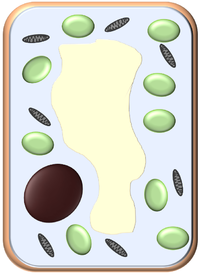Difference between revisions of "Specialised Plant Cell"
(→Beyond the Curriculum) |
|||
| Line 70: | Line 70: | ||
== Beyond the Curriculum == | == Beyond the Curriculum == | ||
| − | === | + | === Unveiling the Marvels of Specialised Plant Cells === |
| − | Specialised plant cells | + | Specialised plant cells are like nature's superheroes, each with a unique power that contributes to the grand story of plants. Let's dive deeper into the world of these incredible cells, uncovering facts that go beyond your usual curriculum. |
| − | ==== | + | ==== Chloroplasts - The Green Energy Factories ==== |
| − | + | Did you know that chloroplasts, the green structures in plant cells, are the powerhouses responsible for photosynthesis? They capture sunlight and convert it into energy, producing the oxygen we breathe. Scientists are studying chloroplasts to improve solar cell efficiency and harness renewable energy. | |
| − | + | ==== Xylem and Phloem - Nature's Plumbing ==== | |
| − | + | Plants have a plumbing system too! Xylem cells transport water and nutrients from the roots to the rest of the plant, while phloem cells move sugars produced during photosynthesis. This remarkable system has inspired engineers working on fluid dynamics in modern transportation networks. | |
| − | + | ==== Plant Cell Specialization ==== | |
| − | + | Plants have their own version of superheroes. Palisade cells, with their tall and closely packed structures, are like the skyscrapers of the plant world, optimizing sunlight absorption. Spongy mesophyll cells create a maze for efficient gas exchange. Guard cells act as gatekeepers, regulating water loss through tiny openings called stomata. | |
| − | + | === The Future of Agriculture === | |
| − | Cutting-edge research is revolutionizing agriculture | + | Cutting-edge research in plant biology is revolutionizing agriculture: |
| − | + | ==== Genetic Engineering for Resilient Crops ==== | |
| − | Scientists are using genetic engineering | + | Scientists are using genetic engineering to develop crops that can withstand harsh environmental conditions and resist pests. This could mean more resilient and sustainable agriculture in the face of climate change. |
| − | + | ==== Medicinal Plants - Nature's Pharmacy ==== | |
| − | Plants | + | Plants have been a source of medicine for centuries. Explore how specialized plant cells are used to produce compounds that treat illnesses, from aspirin derived from willow bark to potent anticancer drugs. |
| − | + | === Adapting to Climate Change === | |
| − | + | Plants and their specialized cells are crucial in the battle against climate change: | |
| − | + | ==== Carbon Capture Champions ==== | |
| − | + | Through photosynthesis, plants capture carbon dioxide and help combat global warming. Researchers are exploring ways to enhance this process to reduce greenhouse gas levels in the atmosphere. | |
| − | + | ==== Surviving Drought ==== | |
| − | Specialized plant cells | + | Specialized plant cells play a vital role in drought resistance. Discover how scientists are engineering crops that can thrive in water-scarce environments, ensuring food security in an uncertain climate. |
| − | + | === Unlocking the Secrets of Nature === | |
| − | As you continue your scientific journey, | + | As you continue your scientific journey, remember that specialized plant cells hold the keys to understanding the natural world and addressing pressing global challenges. The more we learn about these incredible cells, the better equipped we are to create a sustainable future. |
| − | |||
| − | |||
Revision as of 11:25, 20 September 2023
Contents
Key Stage 3
Meaning
A specialised plant cell is a cell that has a special shape or special features to do a certain job in the plant.
About Specialised Plant Cells
- All plants have specialised cells.
- Specialised cells make a plant more efficient than if every cell was the same.
- Specialised cells have specific adaptations that make them good at their function.
- Cells can be specialised by having more mitochondria or chloroplasts than usual or no chloroplasts at all. They may have an elongated shape or an extra large vacuole.
These are some specialised cells in plants that you should know:
Specialised Plant Cells
| Palisade Cell | Spongy Mesophyll Cell | Guard Cells |
| Xylem Cell | Root Hair Cell | |
Key Stage 4
Meaning
Specialised Plant Cells are cells in plants that are adapted for a specific function.
About Specialised Plant Cells
- Multicellular organisms need specialised cells to perform certain functions for that organism.
- Specialised cells make an organism more efficient than if every cell was the same.
- Specialised cells has special adaptations that make them good at their function.
- Cells can be specialised by having more mitochondria or chloroplasts than usual or may have an elongated shape.
These are some specialised cells in plants that you should know:
Examples
| Palisade Cell | Spongy Mesophyll Cell | Guard Cells |
| Xylem Cell | Root Hair Cell | |
Beyond the Curriculum
Unveiling the Marvels of Specialised Plant Cells
Specialised plant cells are like nature's superheroes, each with a unique power that contributes to the grand story of plants. Let's dive deeper into the world of these incredible cells, uncovering facts that go beyond your usual curriculum.
Chloroplasts - The Green Energy Factories
Did you know that chloroplasts, the green structures in plant cells, are the powerhouses responsible for photosynthesis? They capture sunlight and convert it into energy, producing the oxygen we breathe. Scientists are studying chloroplasts to improve solar cell efficiency and harness renewable energy.
Xylem and Phloem - Nature's Plumbing
Plants have a plumbing system too! Xylem cells transport water and nutrients from the roots to the rest of the plant, while phloem cells move sugars produced during photosynthesis. This remarkable system has inspired engineers working on fluid dynamics in modern transportation networks.
Plant Cell Specialization
Plants have their own version of superheroes. Palisade cells, with their tall and closely packed structures, are like the skyscrapers of the plant world, optimizing sunlight absorption. Spongy mesophyll cells create a maze for efficient gas exchange. Guard cells act as gatekeepers, regulating water loss through tiny openings called stomata.
The Future of Agriculture
Cutting-edge research in plant biology is revolutionizing agriculture:
Genetic Engineering for Resilient Crops
Scientists are using genetic engineering to develop crops that can withstand harsh environmental conditions and resist pests. This could mean more resilient and sustainable agriculture in the face of climate change.
Medicinal Plants - Nature's Pharmacy
Plants have been a source of medicine for centuries. Explore how specialized plant cells are used to produce compounds that treat illnesses, from aspirin derived from willow bark to potent anticancer drugs.
Adapting to Climate Change
Plants and their specialized cells are crucial in the battle against climate change:
Carbon Capture Champions
Through photosynthesis, plants capture carbon dioxide and help combat global warming. Researchers are exploring ways to enhance this process to reduce greenhouse gas levels in the atmosphere.
Surviving Drought
Specialized plant cells play a vital role in drought resistance. Discover how scientists are engineering crops that can thrive in water-scarce environments, ensuring food security in an uncertain climate.
Unlocking the Secrets of Nature
As you continue your scientific journey, remember that specialized plant cells hold the keys to understanding the natural world and addressing pressing global challenges. The more we learn about these incredible cells, the better equipped we are to create a sustainable future.




